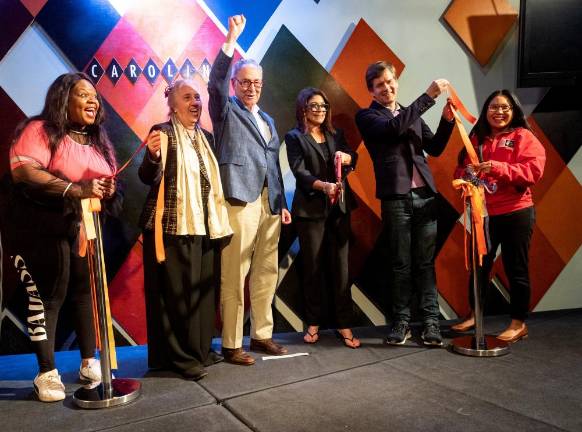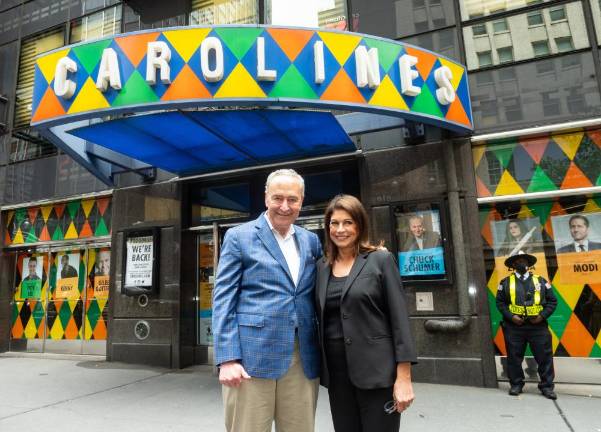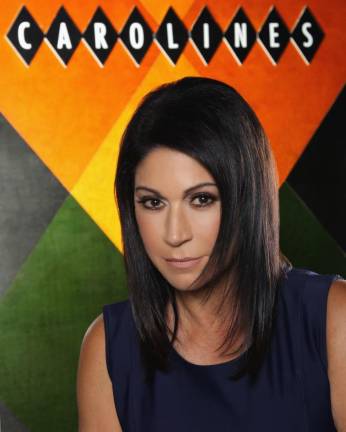Laughing Again with Caroline
Owner and founder of New York’s quintessential comedy club, a “lucky charm” for some of the greatest names in the entertainment industry, looks back on the venue’s storied past and forward to its exciting future



New Yorkers are ready to laugh again, and there’s no better place to do that than in arguably the funniest landmark in the city, Carolines on Broadway. After closing their doors in late March of 2020 due to the COVID-19 pandemic, the humor haven reopened on May 27th and celebrated its relaunch with a ribbon-cutting ceremony this Memorial Day.
We sat down with owner Caroline Hirsch, one afternoon a little over two weeks after being back in business in their iconic Times Square venue. As for the storied comedy house, it looks the same, with photos of all the greats who have performed on their stage still lining the walls, but with apparent differences, like having hand sanitizer at the hostess stand and the stools at the bar spread farther apart than before.
The Brooklyn native — who now lives in Midtown and can conveniently walk to work — is known for her innate ability to recognize up-and-coming talent. “If you stay in that room and if I watch people enough, I’m able to pick out who’s going,” she said. Her impressive resume includes giving Jay Leno, Jerry Seinfeld, Billy Crystal, Robin Williams and Chris Rock their starts at the club. She regaled us with riveting stories from her close to 40-year career, including watching as Williams spontaneously greeted guests one evening and on another night, witnessing Don King crashing John Witherspoon’s set. We also spoke about the changing climate in comedy, and the shift she’s seen after the Me Too movement. “There’s nobody that’s gonna cheer any male on for doing that, pretty much,” she said. “Not here at this club.”
Tell us how you started the club.
So I started in Chelsea with friends of mine who wanted to open a cabaret. And they said, “Oh, come, be a partner with us.” And then all of the sudden it was named Caroline’s and I became very involved with it. And after about less than a year, we turned into really doing all comedy, because we were all really fans of what was happening at that time. And the first big comedian that came in — he wasn’t big at that time — was Jay Leno, followed by Jerry Seinfeld, Billy Crystal.
So how did your initial hiring of Jay Leno come about?
I was a real fan of “The Late Show with David Letterman,” which had just gone on at 12:30 at night. And Jay was on the show a lot and I decided to hire him ... He was wonderful to work with and he’d come in with his wife Mavis and sit at the bar and greet people. And that was the start of it. And then it was followed by Billy Crystal in there. We had Father Guido Sarducci; he was on “Saturday Night Live” at that time. Sandra Bernhard was just coming up the ranks, Carol Leifer, Elayne Boosler ... We had a lot of people that were just starting to break ... Garry Shandling. So they were all part of that first year.
How did you know they all would become big stars?
Well, you know, I was kind of fans of theirs. They had been around and done small TV sketches. And it was like, Sandra Bernhard came in after she was in the movie, “The King of Comedy.” People knew her from there and wanted to see her. Billy Crystal was just coming off ... he did “Soap,” and he came to New York. I had an agent friend who convinced him to do the club. And when he came in to see the club, the producers on SNL saw him there and then he was hired for the next season. Because he was passed over originally for SNL, so then he went on after that.
So, you know, the club was like a lucky charm for a lot of people. Like Pee-wee Herman, Paul Reubens, he tried out an act ... he built a show just to come to Caroline’s. And we got friendly, and then, after that, he did his first movie, which he wanted me involved in, but I didn’t get involved. That was kind of a mistake right there. With an unknown director at the time. He goes, “I have a friend of mine; he’s gonna direct this.” It was Tim Burton. It was Tim Burton’s first directing job. Through this industry, I’ve met the most creative types from Bill Maher ... Still to this day, Bill comes and does the festival [New York Comedy Festival, that Hirsch co-founded]. I get to see him probably once a year, when he comes in to do it. And all the creative types that came out of Caroline’s, whether they’re producers, directors, standups, writers. My friend Carol Leifer’s writing now again; you know, she went to write on “Seinfeld.” She’s writing on “B Positive” and “Curb [Your Enthusiasm].”
Do you have people right now who you think are up-and-coming like they were at that time?
Oh sure, of course. There’s a young woman, Michelle Buteau, who kind of broke her teeth here. And you’ll see she’ll be rising up. There’s so many that come through here. There’s Michael Blackson, that we’re having here. Michael is a fabulous act ... It’s a dynamic place of talent ... Look, a lot of times you have very talented people, but then they don’t do the right thing and they get into trouble ... In a world of cancel culture today, it’s hard. You have to behave yourself.
Todd Phillips famously said that he stopped making comedies because of “woke culture.” Do you look at comedians’ material beforehand?
So he made “Joker?” [Laughs] I don’t look at any material before. It’s clearly enough that we have so many levels you go through to headline here. We pretty much know everybody that headlines here and what their act is about. I don’t think you can say that. I’ve never told a comedian not to say anything. I think I once told one comedian because I found it to be just out of line. And he was just ignorant about the situation. It was way back in the AIDS crisis.
Do you find there’s been a shift in the topics that comedians joke about?
Well, yeah. I think that after the Me Too movement, I think everybody is much more sensitive. Listen, that stuff does not work on stage, to demean women. There’s nobody that’s gonna cheer any male on for doing that, pretty much. Not here at this club ... And look, there have been comedians that have made references and I don’t want them working here and I put the kibosh on it.
Tell us some funny stories from your career.
There was something that happened a long time ago, at my original club. John Witherspoon, who has since passed away, but everybody knew him from all these comedies he did with the Wayans brothers. We were at Caroline’s in Chelsea on Eighth Avenue and I happened to be out to dinner with Don King, the boxing promoter. This is in the middle 80s; it’s a long time ago. And somehow, in John’s act, as I walked in after dinner with Don and a group of people we had dinner with, we heard some reference to Don that John made to his hair or whatever. It was part of his show. Well, we got a whiff of it and we said, “Go in the room! Go!” He walks into the room. John was so startled and the whole audience burst into laughter.
And then there was another incident here with Robin Williams. It didn’t happen on stage, but Robin was across the street in the Brill Building, doing some sound voiceovers for one of his movies. And it was on a Saturday afternoon he went into the sound studio, so afterward he comes in here, right when the show is starting, like we’re seating people. And he’s there at the podium, greeting people. “Hi, how are you? Welcome to the show tonight.” Well, you had to see the expression on people’s faces.
www.carolines.com